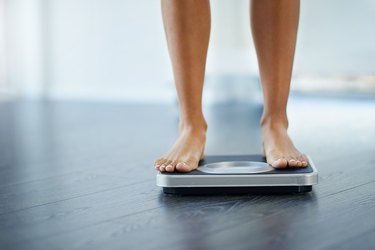
Citalopram hydrobromide is an FDA-approved drug for the treatment of depression. It's a selective serotonin reuptake inhibitor (SSRI) and commonly sold under the brand name Celexa.
According to the Mayo Clinic, SSRIs are effective in treating depression because they primarily work on serotonin, increasing the levels of serotonin in the brain. Serotonin is a neurotransmitter that helps regulate your mood.
Video of the Day
Video of the Day
But citalopram is not a drug intended for use as a weight-loss medication. The National Library of Medicine database indicates through a review of studies, both weight loss and weight gain have occurred with individuals taking citalopram.
How Quickly Does Citalopram Work?
If you are prescribed citalopram by your doctor, you may wonder how long it will take to start working. The National Center for Biotechnology Information (NCBI) suggests that it can anywhere from one to four weeks to start working, but full effect may not happen until eight to 12 weeks into treatment.
The NCBI also indicates a starting dose of citalopram is 20 milligrams per day. This can be taken with or without food, either in the morning or evening. The dose can be increased, as instructed by your physician to 40 milligrams, but this is the maximum dose per day and should only be initiated when instructed. If you're older than 60 years old, then the NCBI recommends the maximum dose is 20 milligrams per day.

Is Weight Loss a Side Effect of Citalopram?
In a review of citalopram for weight loss conducted by the National Library of Medicine, only four percent of patients experienced a decrease in appetite after taking the medication. In clinical trials, the average amount of weight loss was 0.5 kilograms and in one percent of trials, there was an increase in appetite.
In general, though, 2018 study published in The BMJ found that antidepressants, including SSRIs, may be associated with weight gain. They found the greatest amount of weight gain during the second and third years of treatment. Those on antidepressants were at a higher risk for weight gain than those who did not take antidepressants.
According to the National Institutes of Health, other common side effects of patients taking citalopram include headache, drowsiness, nausea, indigestion, increased sweating and sexual dysfunction. Antidepressants like citalopram have also been associated with increased suicidal thoughts and worsening depression in children and young adults, aged 24 years and younger, indicates the NCBI.
Other Causes for Weight Gain
It may not be your antidepressant that's causing your weight gain. Take a look at any other medications you may be prescribed. The University of Rochester Medical Center indicates that other medications, such as birth control pills, beta-blockers, and antipsychotics can also cause weight gain.
Stress, not sleeping enough and other medical conditions can also cause weight gain. If you're concerned about your weight gain, visit your primary healthcare provider. They can help address any other issues or medications you have that may be the cause of your weight gain. They can also refer you to other specialists who may be able to help with any other issues you may be experiencing.
How to Lose Weight on Citalopram
Evaluate your diet and physical activity to ensure they are in check and not causing your weight gain. Take notice of your portion sizes and how many times you eat away from home during the week. Track the number of days you get physical activity. Try taking the stairs more, walk your dog more, and try to get in purposeful physical activity every day.
Tracking your fitness and setting goals can also be helpful. Harvard Medical School suggests that those who are depressed or anxious may eat more and the struggle with weight can worsen depression.
- National Library of Medicine Database: Citalopram
- Mayo Clinic: SSRI
- NCBI: Citalopram
- The BMJ: Antidepressant utilisation and incidence of weight gain during 10 years’ follow-up: population based cohort study
- URMC: When Your Weight Gain is Caused by Medicine
- Harvard Medical School: Why People Become Overweight
- National Institutes of Health: Drug Record Citalopram, Escitalopram